Long-Term Management
TMJ Beautiful Smile
 The orthotic is a diagnostic tool not a permanent solution. It may be tempting to want to stay with the orthotic for an indefinite period since it helps alleviate painful symptoms in a very short time. After your bite is stabilized, your symptoms are dramatically reduced and your teeth, muscles, jaw, and temporomandibular joints are functioning in harmony, you must next arrive at a decision on how to proceed for long-term management and to stay pain free.
The orthotic is a diagnostic tool not a permanent solution. It may be tempting to want to stay with the orthotic for an indefinite period since it helps alleviate painful symptoms in a very short time. After your bite is stabilized, your symptoms are dramatically reduced and your teeth, muscles, jaw, and temporomandibular joints are functioning in harmony, you must next arrive at a decision on how to proceed for long-term management and to stay pain free.
There are a variety of ways to correct your bite in a more permanent way. Some of the most common of these approaches are outlined below:
Coronoplasty/Equilibration
If you were not a “bruxer” and did not grind away the natural tooth structure of your teeth, you may be a candidate for coronoplasty. Coronoplasty is smoothing and reshaping the enamel of the teeth to correct your bite. It is a simple procedure that does not require anesthesia and can be used when the bite is only slightly misaligned and the teeth are in good condition (not ground down from grinding/bruxism)
Orthodontics
Orthodontics, (braces or Invisalign©), to move the teeth to this new ideal position. This option is typically chosen when there is limited restorative work in a patient’s mouth and the natural teeth are in excellent condition (not a bruxer). There will be a likelihood that you will need some Coronoplasty to adjust the bite to it’s optimal position.
Reconstruction
This option is the most comprehensive for function and aesthetics. This option allows us to restore all of the teeth in the appropriate Neuromuscular developed bite. This approach is mostly used when the patient has ground down their teeth so far that “height” will need to be added to the remaining teeth to bring their occlusion to it’s correct Neuromuscular position. The teeth are lengthened by the application of crowns and/or bridges to the remaining tooth structure. This permanently realigns the bite and provides the appropriate structural support for the jaw.
Reconstruction gives Dr. Morgan the opportunity to conduct a complete smile makeover where your jaw will be in its appropriate position and you will have a beautiful smile.
Diagnosis and Treatment
Stabilizing the Bite
Orthotic Appliance
After recording and analyzing all of the diagnostic information compiled from the K7, you will return to the office for your first stage of treatment (3rd visit). Here is where we stabilize your bite in the correct Neuromuscular position.
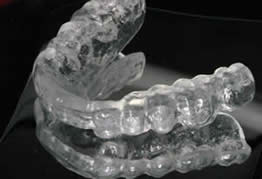 For most patients, the first step is to stabilize the bite by creating a custom Orthotic appliance to be worn on the teeth so your teeth fit together in the correct Neuromuscular position. The orthotic is custom made for each individual patient, based on the statistical data derived from molds of the teeth and the tests recorded on the K7. When the jaws are aligned correctly, the surrounding muscles, jaw and joints can operate in harmony, relieving them of stress, strain and pain. Most patients feel relief within the first several weeks.
For most patients, the first step is to stabilize the bite by creating a custom Orthotic appliance to be worn on the teeth so your teeth fit together in the correct Neuromuscular position. The orthotic is custom made for each individual patient, based on the statistical data derived from molds of the teeth and the tests recorded on the K7. When the jaws are aligned correctly, the surrounding muscles, jaw and joints can operate in harmony, relieving them of stress, strain and pain. Most patients feel relief within the first several weeks.
Wearing the orthotic trains or reprograms the muscles to go to their ideal position. Since the muscles have been tense for such a long period of time, it may take a little while for them to relax into a comfortable position. It usually takes about three months to stabilize the bite and ensure that their symptoms are gone.
Once symptoms are relieved and the bite has been stabilized, Dr. Morgan will move on to the next step to permanently stabilize your bite to the correct position.
Consultation and Evaluation
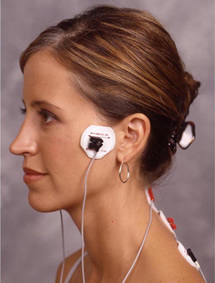 During your consultation visit (1st visit), Dr. Morgan will meet with you to discuss your individual case including your symptoms and potential causes for your discomfort. She will also discuss the main objective ideas behind Neuromuscular Dentistry and how that treatment can potentially can help you. This visit usually takes one hour. Dr. Morgan will discuss your prior medical and symptom history as well as a head, neck, jaw and mouth examination. She will be able to determine if Neuromuscular dentistry is right for your symptoms, pain and problems.
During your consultation visit (1st visit), Dr. Morgan will meet with you to discuss your individual case including your symptoms and potential causes for your discomfort. She will also discuss the main objective ideas behind Neuromuscular Dentistry and how that treatment can potentially can help you. This visit usually takes one hour. Dr. Morgan will discuss your prior medical and symptom history as well as a head, neck, jaw and mouth examination. She will be able to determine if Neuromuscular dentistry is right for your symptoms, pain and problems.
After this visit you will return to the office for a Comprehensive Evaluation.
During your Comprehensive Evaluation (2nd visit), Dr. Morgan and her staff will conduct an extensive physical examination that includes manual testing of the head and neck muscles. She will explain to you why the different muscles and nerves of the face, head and neck can be symptomatic and related to Temporomandibular (TMJ) disorders. This is a very relaxed and open discussion where you will have an opportunity to discuss all the questions that you have, as well as treatment goals. There will be extensive photography of your shoulders, neck and head, your teeth, mouth and face. We will take impressions of the teeth in your mouth to make study models of your teeth to aid in your diagnosis and treatment. We will be able to show you how your bite (occlusion) can be causing your symptoms and pain.
Common Symptoms of TMJ/TMD
Worn or Chipped Teeth
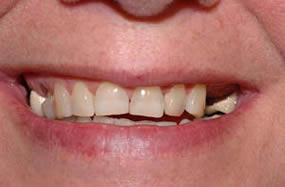 Worn or chipped teeth is by far one of the most common symptoms of clenching or grinding of teeth. Teeth are very strong, however, when there is chronic grinding and clenching, the enamel on the teeth will wear away.
Worn or chipped teeth is by far one of the most common symptoms of clenching or grinding of teeth. Teeth are very strong, however, when there is chronic grinding and clenching, the enamel on the teeth will wear away.
Most patients are not even aware that they grind their teeth, as most patients grind while they sleep. A properly trained Neuromuscular dentist can examine the teeth and identify if grinding is related to your chipped or worn teeth. They can identify and correct the cause of your grinding.
If you see that your teeth look ground down, or you find yourself clenching your teeth, contact Dr. Morgan for a consultation right away. The tooth structure that you loose can only be replaced aesthetically with porcelain restorations.
Dr. Carol F. Morgan, DDS, can help with worn or chipped teeth associated with TMJ disorders whether you live in Virginia Beach, Norfolk, Portsmouth, Chesapeake, Hampton, Newport News, York County, Williamsburg, or any other surrounding city in Hampton Roads.
Norfolk Virginia TMJ Dentist
Depression
 There is no question that chronic pain very commonly causes symptoms of depression. Nobody likes to be in pain and unfortunately nobody like to be around somebody who suffers from chronic pain. Patients who suffer from depression many times have problems with their families at home. We commonly hear from a patient’s spouse how the depression affects the home life. There is an unfortunate amount of people who suffer from TMJ that also suffer from depression. The depression so commonly is misdiagnosed or dismissed as having no physical cause. There is also scientific evidence that shows that patients with chronic pain, a condition that nearly all TMJ patients can claim, have chemical changes in the brain as a result of the pain.
There is no question that chronic pain very commonly causes symptoms of depression. Nobody likes to be in pain and unfortunately nobody like to be around somebody who suffers from chronic pain. Patients who suffer from depression many times have problems with their families at home. We commonly hear from a patient’s spouse how the depression affects the home life. There is an unfortunate amount of people who suffer from TMJ that also suffer from depression. The depression so commonly is misdiagnosed or dismissed as having no physical cause. There is also scientific evidence that shows that patients with chronic pain, a condition that nearly all TMJ patients can claim, have chemical changes in the brain as a result of the pain.
If the depression is severe, many patients need to work with more that one specialist to return to optimal health. Many patients also work with a psychological counselor as well as a chiropractor or physician. Luckily, some patients experience complete relief from the care and treatment of their neuromuscular dentist and do not need the multi-disciplinary approach. Your Neuromuscular Dentist can discuss the many options for treatment that you have.
Dr. Carol F. Morgan, DDS, can help your problems associated with TMJ disorders whether you live in Virginia Beach, Norfolk, Portsmouth, Chesapeake, Hampton, Newport News, York County, Williamsburg or any other surrounding city in Hampton Roads.
Virginia Beach TMJ Dentist
Limited Jaw Movement and Jaw Locking
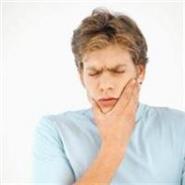 A very common symptom of temporomandibular disorder (TMD / TMJ) is limited jaw movement or the locking of the jaw. You may feel that your lower jaw is catching when you open or close your mouth. There may be times where you cannot open your mouth wide enough to adequately place food in your mouth. In severe cases, patients puree food or eat only soft foods because of limited jaw movement. In Virginia it is not uncommon that a patient with a locked jaw must move the jaw to one side or the other in order to open the mouth to eat or chew. We often hear that a patient needs to “pop” their jaw in order for the jaw to open fully.
A very common symptom of temporomandibular disorder (TMD / TMJ) is limited jaw movement or the locking of the jaw. You may feel that your lower jaw is catching when you open or close your mouth. There may be times where you cannot open your mouth wide enough to adequately place food in your mouth. In severe cases, patients puree food or eat only soft foods because of limited jaw movement. In Virginia it is not uncommon that a patient with a locked jaw must move the jaw to one side or the other in order to open the mouth to eat or chew. We often hear that a patient needs to “pop” their jaw in order for the jaw to open fully.
Limited jaw movement or locking jaw is often a result of malocclusion or bad bite. When the jaw is not properly aligned, it may cause problems with the disc in the jaw joint (TMJ). You may hear popping or clicking or have neck pain, upper back pain or headaches.
A Neuromuscular Dentist is trained to test, diagnose and treat patients who suffer from limited jaw movement or locking of the jaw.
Dr. Carol F. Morgan, DDS, can help your symptoms associated with TMJ disorders whether you live in Virginia Beach, Norfolk, Portsmouth, Chesapeake, Hampton, Newport News, York County, Williamsburg or any other surrounding city in Hampton Roads.
TMJ Dentist Chesapeake
Ringing in the Ears – Tinnitus
The medical term for ringing in the ears is tinnitus. Many patients who live in the Hampton Roads area suffer from tinnitus and seek help from their family doctor or a specialist such as an ear, nose and throat (ENT) doctor. Many times these doctors do not realize that the cause of the ringing is coming from a TMJ disorder. It is commonly misdiagnosed and often goes untreated or is treated ineffectively. Many times the ringing in the ears is a result of having the jaw being out of align which causes a strained bite. The jaw area of the face is a complex network of muscles and nerves, and when the bite is misaligned muscles and nerves throughout the head, including the ears, can be affected.
A Neuromuscular Dentist is trained to diagnose the cause of your tinnitus. It may be related to an unstable or misaligned bite. The dentist can work with the source of the problem by stabilizing and realigning the bite so that the entire jaw area works together without pain and ringing in your ears.
Dr. Carol F. Morgan, DDS, can help the ringing in your ears that is associated with TMJ disorders whether you live in Virginia Beach, Norfolk, Portsmouth, Chesapeake, Hampton, Newport News, York County, Williamsburg or any other surrounding city in Hampton Roads.
Virginia Beach TMJ Dentist
Popping, Clicking and Snapping in the Jaw Joint
 Many patients throughout Virginia who suffer from TMJ or TMD experience popping, clicking or snapping in the jaw joint. It is one of the most common symptoms of TMJ and TMD. The popping and clicking sounds many times are surprisingly loud where it may be heard by others when you chew or speak. Not all patients complain of pain in their jaw when the clicking or popping sound is heard and therefore, do not believe that they have a temporomandibular disorder.
Many patients throughout Virginia who suffer from TMJ or TMD experience popping, clicking or snapping in the jaw joint. It is one of the most common symptoms of TMJ and TMD. The popping and clicking sounds many times are surprisingly loud where it may be heard by others when you chew or speak. Not all patients complain of pain in their jaw when the clicking or popping sound is heard and therefore, do not believe that they have a temporomandibular disorder.
The popping and clicking sounds that you hear many times is the displacing of the discs in your jaw joints. The jaw joints are ball and socket type of joints very similar to the hip joints and shoulder joints. The disc, or cartilage, in the joint allows the ball to glide smoothly in and out of the socket. When there is dysfunction in the joint, commonly caused by the muscles of the joint pulling the jaw out of it’s intended path, you may hear popping and clicking. You may also experience pain. If the disc is severely misplaced, your jaw may be limited on how wide it can open or may be locked shut.
A Neuromuscular Dentist can properly test and evaluate you and realign your bite, which also realigns the displaced disc. Once the jaw is realigned and the disc is back in place the clicking and popping sounds in the jaw usually subsides as the muscles holding the disc in place relax, alleviating the jaw, face, head, neck, back, and shoulder pain that resulted.
Dr. Carol F. Morgan, DDS, can help you if you have popping and clicking in your jaw joints associated with TMJ disorders whether you live in Virginia Beach, Norfolk, Portsmouth, Chesapeake, Hampton, Newport News, York County, Williamsburg or any other surrounding city in Hampton Roads.
Virginia Beach TMJ Dentist
Jaw Pain
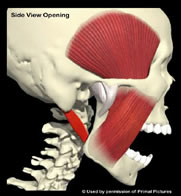 When there is disharmony with how your teeth fit together (bad bite or malocclusion), classic Temporomandiblar disorder (TMD / TMJ) symptoms may follow. Patients often complain of clenching or grinding their teeth, or having to chew on one side of the mouth or the other. These symptoms may cause unequal stresses on the muscles that are used to move the jaw during normal activities of daily living. The muscles often fatigue and become sore or spasm and cause pain.
When there is disharmony with how your teeth fit together (bad bite or malocclusion), classic Temporomandiblar disorder (TMD / TMJ) symptoms may follow. Patients often complain of clenching or grinding their teeth, or having to chew on one side of the mouth or the other. These symptoms may cause unequal stresses on the muscles that are used to move the jaw during normal activities of daily living. The muscles often fatigue and become sore or spasm and cause pain.
Many patients throughout Virginia complain of jaw pain or tiredness of their jaw muscles. They may see several dentists that may simply suggest a night guard because they usually grind their teeth. You may also be suggested to try a deprogrammer or discluder device. This type of treatment without the proper diagnostics tests and workup is like putting a bandage on a broken arm. One size does not fit all and every patient’s diagnosis and treatment plan are different.
A Neuromuscular Dentist can help alleviate jaw pain related to TMJ / TMD by realigning the bite. Once the jaw is back into its natural and most relaxed position the surrounding muscles can also resume their natural painless function.
Dr. Carol F. Morgan, DDS, can help your jaw pain associated with TMJ disorders whether you live in Virginia Beach, Norfolk, Portsmouth, Chesapeake, Hampton, Newport News, York County, Williamsburg or any other surrounding city in Hampton Roads.
Virginia Beach TMJ Dentist
Loose Teeth
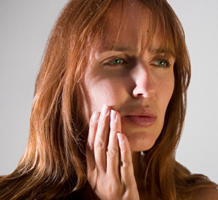 People who suffer from Temporomandibular disorder (TMJ / TMD) many times indicate that one or more of their teeth feel loose. This often occurs when they wake in the morning. This common symptom is a direct result of a patient clenching or grinding their teeth. The chronic clenching and grinding applies undue stress on the ligaments that hold the teeth into the jaw. Similar to the repeated bending of a paper clip that eventually breaks, applying repeated stresses to the teeth will loosen the grip that the ligaments have on the teeth.
People who suffer from Temporomandibular disorder (TMJ / TMD) many times indicate that one or more of their teeth feel loose. This often occurs when they wake in the morning. This common symptom is a direct result of a patient clenching or grinding their teeth. The chronic clenching and grinding applies undue stress on the ligaments that hold the teeth into the jaw. Similar to the repeated bending of a paper clip that eventually breaks, applying repeated stresses to the teeth will loosen the grip that the ligaments have on the teeth.
This condition will likely lead to periodontial disease. It is important that you find the correct skilled dentist to consult to address this problem. A Neuromuscular Dentist is trained in reducing the symptoms of TMJ / TMD and addressing the root cause of the problem. If you find that you have loose teeth, you may have the symptoms of Temporomandibular disorder. Dr. Morgan can help.
Dr. Carol F. Morgan, DDS, can help you if you have loose teeth associated with TMJ disorders whether you live in Virginia Beach, Norfolk, Portsmouth, Chesapeake, Hampton, Newport News, York County, Williamsburg or any other surrounding city in Hampton Roads.
 The orthotic is a diagnostic tool not a permanent solution. It may be tempting to want to stay with the orthotic for an indefinite period since it helps alleviate painful symptoms in a very short time. After your bite is stabilized, your symptoms are dramatically reduced and your teeth, muscles, jaw, and temporomandibular joints are functioning in harmony, you must next arrive at a decision on how to proceed for long-term management and to stay pain free.
The orthotic is a diagnostic tool not a permanent solution. It may be tempting to want to stay with the orthotic for an indefinite period since it helps alleviate painful symptoms in a very short time. After your bite is stabilized, your symptoms are dramatically reduced and your teeth, muscles, jaw, and temporomandibular joints are functioning in harmony, you must next arrive at a decision on how to proceed for long-term management and to stay pain free.
 For most patients, the first step is to stabilize the bite by creating a custom Orthotic appliance to be worn on the teeth so your teeth fit together in the correct Neuromuscular position. The orthotic is custom made for each individual patient, based on the statistical data derived from molds of the teeth and the tests recorded on the K7. When the jaws are aligned correctly, the surrounding muscles, jaw and joints can operate in harmony, relieving them of stress, strain and pain. Most patients feel relief within the first several weeks.
For most patients, the first step is to stabilize the bite by creating a custom Orthotic appliance to be worn on the teeth so your teeth fit together in the correct Neuromuscular position. The orthotic is custom made for each individual patient, based on the statistical data derived from molds of the teeth and the tests recorded on the K7. When the jaws are aligned correctly, the surrounding muscles, jaw and joints can operate in harmony, relieving them of stress, strain and pain. Most patients feel relief within the first several weeks. During your consultation visit (1st visit), Dr. Morgan will meet with you to discuss your individual case including your symptoms and potential causes for your discomfort. She will also discuss the main objective ideas behind Neuromuscular Dentistry and how that treatment can potentially can help you. This visit usually takes one hour. Dr. Morgan will discuss your prior medical and symptom history as well as a head, neck, jaw and mouth examination. She will be able to determine if Neuromuscular dentistry is right for your symptoms, pain and problems.
During your consultation visit (1st visit), Dr. Morgan will meet with you to discuss your individual case including your symptoms and potential causes for your discomfort. She will also discuss the main objective ideas behind Neuromuscular Dentistry and how that treatment can potentially can help you. This visit usually takes one hour. Dr. Morgan will discuss your prior medical and symptom history as well as a head, neck, jaw and mouth examination. She will be able to determine if Neuromuscular dentistry is right for your symptoms, pain and problems. Worn or chipped teeth is by far one of the most common symptoms of clenching or grinding of teeth. Teeth are very strong, however, when there is chronic grinding and clenching, the enamel on the teeth will wear away.
Worn or chipped teeth is by far one of the most common symptoms of clenching or grinding of teeth. Teeth are very strong, however, when there is chronic grinding and clenching, the enamel on the teeth will wear away. There is no question that chronic pain very commonly causes symptoms of depression. Nobody likes to be in pain and unfortunately nobody like to be around somebody who suffers from chronic pain. Patients who suffer from depression many times have problems with their families at home. We commonly hear from a patient’s spouse how the depression affects the home life. There is an unfortunate amount of people who suffer from TMJ that also suffer from depression. The depression so commonly is misdiagnosed or dismissed as having no physical cause. There is also scientific evidence that shows that patients with chronic pain, a condition that nearly all TMJ patients can claim, have chemical changes in the brain as a result of the pain.
There is no question that chronic pain very commonly causes symptoms of depression. Nobody likes to be in pain and unfortunately nobody like to be around somebody who suffers from chronic pain. Patients who suffer from depression many times have problems with their families at home. We commonly hear from a patient’s spouse how the depression affects the home life. There is an unfortunate amount of people who suffer from TMJ that also suffer from depression. The depression so commonly is misdiagnosed or dismissed as having no physical cause. There is also scientific evidence that shows that patients with chronic pain, a condition that nearly all TMJ patients can claim, have chemical changes in the brain as a result of the pain. A very common symptom of temporomandibular disorder (TMD / TMJ) is limited jaw movement or the locking of the jaw. You may feel that your lower jaw is catching when you open or close your mouth. There may be times where you cannot open your mouth wide enough to adequately place food in your mouth. In severe cases, patients puree food or eat only soft foods because of limited jaw movement. In Virginia it is not uncommon that a patient with a locked jaw must move the jaw to one side or the other in order to open the mouth to eat or chew. We often hear that a patient needs to “pop” their jaw in order for the jaw to open fully.
A very common symptom of temporomandibular disorder (TMD / TMJ) is limited jaw movement or the locking of the jaw. You may feel that your lower jaw is catching when you open or close your mouth. There may be times where you cannot open your mouth wide enough to adequately place food in your mouth. In severe cases, patients puree food or eat only soft foods because of limited jaw movement. In Virginia it is not uncommon that a patient with a locked jaw must move the jaw to one side or the other in order to open the mouth to eat or chew. We often hear that a patient needs to “pop” their jaw in order for the jaw to open fully. Many patients throughout Virginia who suffer from TMJ or TMD experience popping, clicking or snapping in the jaw joint. It is one of the most
Many patients throughout Virginia who suffer from TMJ or TMD experience popping, clicking or snapping in the jaw joint. It is one of the most When there is disharmony with how your teeth fit together (bad bite or malocclusion), classic Temporomandiblar disorder (TMD / TMJ) symptoms may follow. Patients often complain of clenching or grinding their teeth, or having to chew on one side of the mouth or the other. These
When there is disharmony with how your teeth fit together (bad bite or malocclusion), classic Temporomandiblar disorder (TMD / TMJ) symptoms may follow. Patients often complain of clenching or grinding their teeth, or having to chew on one side of the mouth or the other. These  People who suffer from Temporomandibular disorder (TMJ / TMD) many times indicate that one or more of their teeth feel loose. This often occurs when they wake in the morning. This common symptom is a direct result of a patient clenching or grinding their teeth. The chronic clenching and grinding applies undue stress on the ligaments that hold the teeth into the jaw. Similar to the repeated bending of a paper clip that eventually breaks, applying repeated stresses to the teeth will loosen the grip that the ligaments have on the teeth.
People who suffer from Temporomandibular disorder (TMJ / TMD) many times indicate that one or more of their teeth feel loose. This often occurs when they wake in the morning. This common symptom is a direct result of a patient clenching or grinding their teeth. The chronic clenching and grinding applies undue stress on the ligaments that hold the teeth into the jaw. Similar to the repeated bending of a paper clip that eventually breaks, applying repeated stresses to the teeth will loosen the grip that the ligaments have on the teeth.